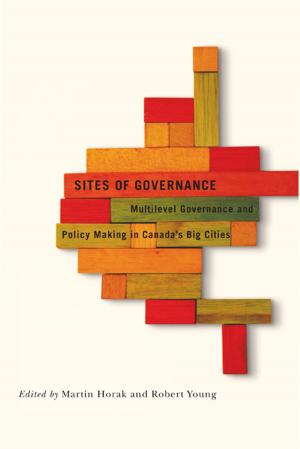Innovation, Science, Environment 08/09
Canadian Policies and Performance, 2008-2009
Nonfiction, Science & Nature, Science| Author: | Glen Toner | ISBN: | 9780773577749 |
| Publisher: | MQUP | Publication: | May 23, 2008 |
| Imprint: | MQUP | Language: | English |
| Author: | Glen Toner |
| ISBN: | 9780773577749 |
| Publisher: | MQUP |
| Publication: | May 23, 2008 |
| Imprint: | MQUP |
| Language: | English |
Rapidly developing changes in technology, scientific knowledge, and domestic and international environmental issues force analysts to constantly reevaluate how public policy is coping. Are governments leading, following, or falling behind other societal actors? This third volume in a series of annual assessments of Canadian public policy provides an innovative approach to evaluating key developments in one of the most challenging areas of public policy in the twenty-first century. Leading experts look at crucial issues such as climate change, sustainable development policy tools, science management, and the international approach to governing intellectual property. They address recent developments within the pesticide, wildlife, and infrastructure policy areas involving the federal government and key private and non-governmental players. The 2008-09 volume explores the role of governments in a number of key areas, showing that while government institutions and policies should be part of the solution to the complex array of science and technology and environment and development issues facing Canadians, too often it appears they are part of the problem. Contributors include Glen Toner (Carleton), Robert Paehlke (Trent), Mark Jaccard and Rose Murphy (Simon Fraser), Jac van Beek (Canada Foundation for Innovation) and Frances Issaacs (National Research Council of Canada), Sara Bannerman (Carleton), Robert Gibson (Waterloo), David Robinson (Laurentian), Francois Bregha (Stratos Inc.), Scott Findlay and Annick Dezeil (Ottawa), Robert Hilton and Christopher Stoney (Carleton), and Jeremy Wilson (Victoria).
Rapidly developing changes in technology, scientific knowledge, and domestic and international environmental issues force analysts to constantly reevaluate how public policy is coping. Are governments leading, following, or falling behind other societal actors? This third volume in a series of annual assessments of Canadian public policy provides an innovative approach to evaluating key developments in one of the most challenging areas of public policy in the twenty-first century. Leading experts look at crucial issues such as climate change, sustainable development policy tools, science management, and the international approach to governing intellectual property. They address recent developments within the pesticide, wildlife, and infrastructure policy areas involving the federal government and key private and non-governmental players. The 2008-09 volume explores the role of governments in a number of key areas, showing that while government institutions and policies should be part of the solution to the complex array of science and technology and environment and development issues facing Canadians, too often it appears they are part of the problem. Contributors include Glen Toner (Carleton), Robert Paehlke (Trent), Mark Jaccard and Rose Murphy (Simon Fraser), Jac van Beek (Canada Foundation for Innovation) and Frances Issaacs (National Research Council of Canada), Sara Bannerman (Carleton), Robert Gibson (Waterloo), David Robinson (Laurentian), Francois Bregha (Stratos Inc.), Scott Findlay and Annick Dezeil (Ottawa), Robert Hilton and Christopher Stoney (Carleton), and Jeremy Wilson (Victoria).















